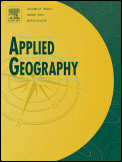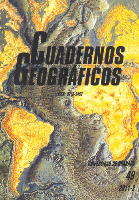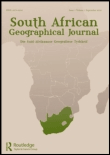
APPLIED GEOGRAPHY
Scope & Guideline
Unveiling practical applications in geography and planning.
Introduction
Aims and Scopes
- Spatial Analysis and Modeling:
Utilizes advanced spatial analysis techniques and modeling approaches to understand and visualize complex geographic phenomena, including urban dynamics, land use change, and environmental impacts. - Ecosystem Services and Environmental Management:
Explores the relationship between human activities and ecosystem services, assessing their implications for environmental management and sustainability in various contexts. - Urban Geography and Planning:
Investigates urbanization processes, the impact of built environments on communities, and the effectiveness of urban planning strategies to enhance livability and accessibility. - Social and Economic Inequalities:
Examines spatial inequalities concerning socioeconomic factors, focusing on how these disparities influence access to resources, services, and opportunities across different populations. - Community Engagement and Participatory Approaches:
Emphasizes participatory methodologies in geographic research, enabling local communities to engage in decision-making processes related to environmental and urban planning. - Health Geography:
Analyzes the spatial dimensions of health and disease, investigating how geographic factors influence health outcomes and access to healthcare services. - Technological Integration:
Incorporates modern technologies such as GIS, remote sensing, and machine learning into geographic research to enhance data collection, analysis, and visualization.
Trending and Emerging
- Climate Change Impacts and Adaptation:
There is a notable increase in research addressing the impacts of climate change on various geographic phenomena, including urban resilience, disaster management, and ecological adaptation strategies. - Spatial Data Science and Big Data Applications:
The integration of big data analytics and spatial data science is on the rise, with researchers employing machine learning and AI techniques to analyze complex spatial relationships and patterns. - Social Justice and Environmental Equity:
A growing emphasis on social justice and environmental equity is evident, as researchers explore how spatial factors contribute to disparities in access to resources and environmental benefits. - Health and Spatial Epidemiology:
The intersection of geography and health is increasingly prominent, with a focus on spatial epidemiology and the effects of environmental factors on public health outcomes. - Urban Mobility and Accessibility:
Research on urban mobility, including the accessibility of transportation systems and their impact on social equity, has gained traction, reflecting the need for sustainable urban planning. - Community Resilience and Adaptation:
Emerging studies emphasize community resilience in the face of environmental and social challenges, exploring local responses and adaptations to changing conditions.
Declining or Waning
- Traditional Land Use Studies:
Research focused solely on traditional land use patterns without integrating contemporary concerns such as sustainability and climate change seems to be declining, as the field moves towards more dynamic and integrative approaches. - Static Demographic Studies:
Studies that analyze demographic data in a static manner without considering the implications of mobility, migration, and dynamic population changes are less frequently published, reflecting a shift towards more fluid and context-driven analyses. - Conventional Economic Geography:
Research that primarily addresses economic geography through traditional frameworks is waning, as newer interdisciplinary approaches that incorporate social, environmental, and technological factors gain traction. - Single-Factor Analyses:
Studies that focus on single factors affecting geographic phenomena are less common, with a growing preference for multifactorial analyses that provide a more holistic understanding of complex issues. - Outdated Methodologies:
The use of outdated methodologies that do not incorporate advanced technologies or data sources is becoming less prevalent, as the field embraces innovative techniques and interdisciplinary collaborations.
Similar Journals

GEOJOURNAL
Navigating the Future of Environmental ManagementGEOJOURNAL, published by SPRINGER, is a distinguished academic journal that occupies a pivotal role in the fields of geography, planning, and development. With a robust ISSN of 0343-2521 and an E-ISSN of 1572-9893, it has been a cornerstone of scholarly communication since its inception in 1977. Operating from the Netherlands, GEOJOURNAL offers insightful research articles that delve into the dynamics of spatial analysis, environmental management, urban studies, and regional development, thus catering to a diverse readership of researchers, professionals, and students alike. The journal boasts an impressive Scopus ranking of #176 out of 821 in its category, positioning it in the top 22% percentile while maintaining a Q2 quartile ranking in Geography, Planning, and Development as of 2023. With access options available, GEOJOURNAL remains a vital platform for disseminating cutting-edge research and fostering academic collaboration, indispensable for those engaging with contemporary geographic challenges and innovative solutions. Engage with GEOJOURNAL to enrich your understanding and contribute to critical discussions in this ever-evolving field.

Cuadernos Geograficos
Bridging theory and practice in planning and development.Cuadernos Geograficos is a distinguished open access journal published by UNIV GRANADA in Spain, dedicated to advancing the fields of geography, planning, and earth-surface processes. With an ISSN of 0210-5462 and E-ISSN 2340-0129, this journal has been serving as an essential platform for scholars since its inception in 1983. By providing rigorous peer-reviewed research, Cuadernos Geograficos contributes significantly to the academic discourse within these disciplines, holding a respectable position in the Q3 category for both Earth-Surface Processes and Geography, Planning, and Development as of 2023. The journal is indexed in Scopus, ranking #431/821 in Social Sciences and #100/179 in Earth and Planetary Sciences, affirming its relevance and impact within the scholarly community. With its commitment to open access since 1999, Cuadernos Geograficos ensures that vital research is accessible to a diverse audience of researchers, professionals, and students, fostering knowledge sharing and collaborative advancements in the geographical sciences.

Geographia Polonica
Navigating the Complexities of Place and SpaceGeographia Polonica is a premier academic journal published by the Polish Academy of Sciences, Institute of Geography and Spatial Organization, renowned for its contributions to the field of geography and related disciplines. With a history spanning from 1972, it has evolved into a vital resource for researchers and professionals, addressing a wide spectrum of topics from cultural studies to urban planning and development. Geographia Polonica is indexed with impressive rankings in various categories, including a Q1 classification in Cultural Studies and significant positions in Earth and Planetary Sciences and Urban Studies, reflecting its influence and recognition in these critical areas. Although it operates under a traditional subscription model, its commitment to high-quality, peer-reviewed research ensures that the latest findings and advancements are accessible to the academic community. With its rich archival content and contemporary insights, Geographia Polonica serves as an essential platform for scholarly dialogue, making it an invaluable reference for students, researchers, and professionals eager to explore the complexities of spatial organization and geographical phenomena in a global context.

GEOGRAPHY
Transforming Knowledge into Sustainable SolutionsGEOGRAPHY is a distinguished academic journal published by Taylor & Francis Ltd, providing a pivotal platform for scholarly discourse in the fields of Geography, Planning and Development, and Earth-Surface Processes. With an ISSN of 0016-7487 and E-ISSN 2043-6564, this journal has been at the forefront of geographical research since its inception in 1979, with an emphasis on disseminating high-quality, peer-reviewed articles that advance understanding in both theoretical and applied aspects of geography. Currently ranked in the Q2 category for both Earth-Surface Processes and Geography, Planning and Development, GEOGRAPHY occupies a significant position within its discipline, holding a Scopus ranking of #462/821 in Social Sciences and #104/179 in Earth and Planetary Sciences as of 2023. Although it does not operate on an Open Access model, it continues to attract a broad readership from academia and industry alike, fostering insights that contribute to sustainable development and environmental stewardship. Researchers, professionals, and students will find in GEOGRAPHY a rich repository of knowledge crucial for navigating the complexities of our planet’s landscapes and societies.

Hrvatski Geografski Glasnik-Croatian Geographical Bulletin
Elevating Geographical Scholarship for AllHrvatski Geografski Glasnik-Croatian Geographical Bulletin, ISSN 1331-5854, E-ISSN 1848-6401, is an esteemed open-access journal published by the Croatian Geographical Society that has been serving the geography community since 1929. Based in Zagreb, Croatia, this journal focuses on a broad spectrum of geographical research, providing a platform for the dissemination of original articles, reviews, and case studies that contribute to the understanding of earth-surface processes and development planning. Although it currently holds Q4 rankings in both Earth-Surface Processes and Geography, Planning and Development, the journal is dedicated to enhancing its impact within the scientific community, aspiring to elevate research visibility and collaborative opportunities. With a commitment to open access, it ensures that all content is readily available to researchers, professionals, and students worldwide, fostering an inclusive environment for geographical scholarship. Engaging with this journal presents an opportunity to stay updated with emerging trends and pivotal studies within the discipline throughout its converged years from 1998 to 2024, making it a vital resource in geography and related fields.

Geo UERJ
Advancing Research for a Sustainable FutureGeo UERJ is a renowned open-access journal published by Universidade do Estado do Rio de Janeiro (UNIV ESTADO RIO JANEIRO), focused on the multifaceted study of geography and related disciplines. Established to foster innovation and disseminate high-quality research, Geo UERJ has been dedicated to making scholarly work accessible since its transition to open access in 2007. The journal aims to provide a platform for researchers, professionals, and students to share insights into geographical phenomena, environmental issues, and urban studies, contributing to the global discourse on sustainability and spatial analysis. Its publications serve as valuable resources for academicians looking to stay abreast of cutting-edge developments within the geography field. With the ISSN 1415-7543 and E-ISSN 1981-9021, Geo UERJ invites contributions from diverse perspectives, enriching the academic landscape with important geographic research from Brazil and beyond.

Revista Geografica de America Central
Unveiling the Dynamics of Central American Landscapes.Revista Geografica de America Central is a distinguished scholarly journal published by the UNIV NACL, ESCUELA CIENCIAS GEOGRAFICAS, focusing on the dynamic field of geography, particularly within Central America. Since its inception in 1974, the journal has championed the dissemination of open-access research, fostering collaboration and innovation among researchers, professionals, and students alike. With an evolving scope that reflects the region's rich geographical diversity, this journal serves as a vital platform for sharing empirical studies, theoretical advancements, and methodological discussions that enhance our understanding of Central America's unique environmental and socio-economic challenges. Although it has experienced various coverage periods, the journal remains committed to advancing geographic scholarship and supporting open academic discourse. Its open-access model ensures that essential knowledge is readily available to an expanding global audience, making it an invaluable resource in the field.

Boletin de la Asociacion de Geografos Espanoles
Championing open access to vital geographical knowledge.Boletin de la Asociacion de Geografos Espanoles is a leading open-access journal dedicated to advancing knowledge in the fields of geography, urban studies, and environmental science. Published by the ASOCIACION ESPANOLES DE GEOGRAFIA, this esteemed journal has been a vital platform for geographers and researchers since 1984, facilitating the dissemination of high-quality research and insights. With an ISSN of 0212-9426 and E-ISSN of 2605-3322, the journal has been recognized for its contributions, currently ranking in Q3 in Earth-Surface Processes, Environmental Science, and Geography, Planning and Development, as well as Q2 in Urban Studies for 2023. The journal’s accessibility ensures a broad audience reach, supporting the engagement of researchers and professionals alike. Located in Madrid, Spain, and publishing from 2006 to 2024, the Boletin de la Asociacion de Geografos Espanoles stands as an essential resource for those invested in the geographical sciences and related disciplines.

South African Geographical Journal
Fostering dialogue for impactful geographical solutions.The South African Geographical Journal, published by Routledge Journals, Taylor & Francis Ltd, is a leading scholarly platform dedicated to advancing research in the fields of geography, planning, and development. With an impressive history spanning from 1931 to 2024, this journal not only retains its relevance in the academic community but also proudly holds a Q2 rank in both Earth and Planetary Sciences and Geography, Planning and Development, marking it as a significant contributor to the scholarly discourse. The journal is ranked in the top 32% of its category within Scopus, affirming its stature among researchers and professionals. Although it currently does not offer Open Access, the journal provides a critical forum for the exchange of ideas, methodologies, and findings, encouraging dialogue that informs policy and practice in the geographical sciences. Readers can expect a rich variety of articles that encompass both theoretical and practical aspects of geography, making it essential for academics and practitioners alike.

Biblio 3W-Barcelona
Connecting professionals through high-quality research.Biblio 3W-Barcelona is a prominent academic journal published by the Universitat de Barcelona, Servei Publicacions, focusing on the dynamic field of library and information science. Established to foster scholarly communication, this journal provides a platform for researchers, professionals, and students dedicated to the advancement of bibliographic studies and library management. Despite lacking a current impact factor, Biblio 3W-Barcelona is recognized for its commitment to high-quality research and its contribution to the field, making it a valuable resource for those engaged in understanding the complexities of information dissemination in modern society. The journal features original research articles, critical reviews, and case studies that invite varied perspectives within the realm of librarianship. Readers can access its comprehensive body of work freely, enriching their knowledge and fostering practical applications in library science. For submission guidelines and further information, visit their website.